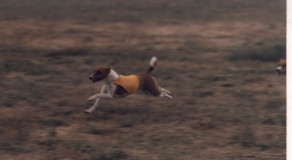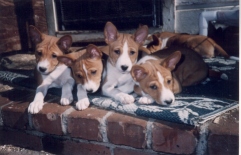| Home |
| About Us |
| About Basenjis |
| Health Concerns |
| Latest News |
| What We've Bred |
| All The Dogs |
| Expected Litters |
| Stud Dogs |
| Young Hopefuls |
| Available Basenjis |
| Our View on Diet |
| Archives |
| Links |
Is a Basenji the right dog for you? - How do you find a Basenji?
 |
The Basenji is native to Central Africa. He does not bark, but he is not mute. He can make all the same noises that a wolf or coyote can make. He can scream, cry, howl, whine and growl. When he is very happy he makes a "chordle" or "yodel" sound. (Some think it sounds like crowing.) |
 |
| A Basenji is a hunting dog. They are used by natives in Africa to chase large game into nets where it is then speared by the natives. They also hunt small game such as rodents. A Basenji hunts with it's eyes and can see very far. It is the natural instinct of a Basenji to chase things that are moving fast. Basenjis are extremely quick and a large percentage of Basenjis that get loose on the streets end up hit by cars and killed. For this reason, Basenjis should always be kept on leash when not in a completely fenced area. |
 |
 |
A big misconception about Basenjis is that, because they are clean and don't bark, they make good apartment dogs. Not true! Basenjis are very smart and bore easily. Therefore, leaving a Basenji loose and unsupervised in your house is much like leaving a three year old loose and unsupervised! They are going to entertain themselves and it will, most likely, be in a way that would not please you. Besides chewing and/or destroying things in your house, an unsupervised Basenji can cause injury to themselves. In addition, Basenjis love the sun. On sunny days, even if the door to the house is left open, our Basenjis prefer to lie out in the yard and soak up the sun. We feel that Basenjis do best when they have a yard to be in during the day when their owner is away and a nice warm house to be in when their owner is home. |
IS A BASENJI THE RIGHT DOG FOR YOU?
When looking for a dog, one of the most important things to consider is the function of the breed(s) you are considering. In other words, what was the breed of dog bred for? The breed's function can give you clues about the typical behavior you can expect. For example, most Terriers were bred to hunt vermin. If your child has a couple of pet hamsters, then a Terrier would probably be a bad choice! It would be only natural for the Terrier to try to kill the hamsters and it would be unfair for you to punish it if it did.
Basenjis were bred to hunt. If they get loose, they almost alway run off. It's not that they don't love their owners, it's just that their instinct to hunt is stronger then their desire to please.
If you're looking for a dog you can take to a park, turn loose and throw a ball for it, a Basenji is not the dog for you.
If you're willing to keep your dog on leash whenever he is outside of his fenced yard, a Basenji may be the dog for you.
Although Basenjis have a relationship with natives in Africa, they were not bred to please man like working or sporting dogs were. We highly recommend obedience training and although they are certainly trainable, Basenjis are always trying to out-smart you. Some people find this entertaining, others can not stand to live with it.
If you're looking for a "push-button" obedience dog, a Basenji is not the dog for you.
If you're willing to work with a challenging dog, a Basenji might be the dog for you.
Basenjis are great house-pets, when you are there. A Basenji left on their own can be a bundle of destruction. However, a Basenji should not be left outside 24 hours a day. They need and crave the company of humans and should be with the family when you are home.
If you're looking for a "yard dog", a Basenji is not the dog for you.
If you have a fenced yard and are willing to have your dog in the house when you're home, but outside when you're not, a Basenji might be the dog for you.
If you want a completely predictable, 100% reliable, always-listens-to-you dog, a Basenji is definatley not the dog for you.
But, if you love to be entertained, aren't too proud to be out-smarted once in while and are willing to be fair and consistant with a dog that may not give you the same courtesy, a Basenji just might be the dog for you!
Sally Wallis is a Basenji breeder in England. Her "Zande Put-Off" is highly recommended reading for someone considering a Basenji as their pet.
Use your browser's back button to return to our web-site.
Some common questions we hear are;
Does a Basenji make a good watch dog?
The answer is "NO".
Once in a while a Basenji will let out a short bark sound - usually when he is startled or frightened. People are always quick to yell "He Barked!" and I guess he did. However, although he can make a short bark sound, he still has no instinct to repeatedly bark like other dogs. If someone knocks on the door, Basenjis do not bark - they just run to the door. In addition, Basenjis have a "self survival" instinct. If someone broke into a home with a Basenji, the Basenji may go after the intruder at first. However, if the intruder hit or kicked the Basenji, or threw anything at him, the Basenji would most likely run the other way. After all, Basenjis do not survive in Africa by putting themselves between anything and danger.
Do Basenjis get along with cats?
If they are raised with cats, Basenjis get along with them fine. At least one half of our puppies have gone to homes with cats or kittens - to date there have been no problems.
(to see photos of Basenjis with cats - see our "House-pets" page under the "What We've Bred" or "Our Dogs" links)
Can we have a Basenji with another breed of dog?
Basenjis get along quite well with other breeds of dogs. We usually recommend that the dogs - whether both Basenjis, or of different breeds - be of opposite gender. A boy and a girl tend to get along better then a boy and a boy or a girl and a girl.
(to see photos of Basenjis with other breeds, or other Basenjis - see our "House-pets" page under the "What We've Bred" or "Our Dogs" links)
Can we have a Basenji with children?
The only time we've seen a problem with Basenjis and children is if an older dog have never been around children before and a child grabs their ears or tail or something like that. If children act responsibly, the dogs are usually fine.
We sell many Basenjis into homes with children and so far everyone gets along fine. In addition, several single couples have added children to their family after they acquired a Basenji and so far all of the Basenjis have accepted the new family member without much fuss.
(to see photos of Basenjis with children - see our "House-pets" page under the "What We've Bred" or "Our Dogs" link)
Can we take a Basenji to a "Dog Park"?
Our answer is NO.
We feel that dog parks are a very bad idea in general. For those of you who don't know, a dog park is a large, fenced park where everyone takes their dogs and turns them loose together. The idea, while good on paper, has a great potential for problems.
First of all, you're taking all different breeds of dogs, bred for many different purposes, raised by different people with different levels of discipline and turning them loose to do as they please. Some breeds are bred to chase, some are bred to run, some are bred for aggression, etc. Not a good combination all loose together.
In this situation, a Basenji is a double-edged sword. Drop a Basenji in a dog park and he's likely to take off running - "I'm Freeeeee!" - most likely the dog(s) chasing him aren't looking to play. Then, the other side of the blade, your neighbor lady brings her little fluffy to the dog park and it takes off running - a Basenji is likely to "get" it first and figure out it's not a rabbit afterward.
Julie has worked at a vet clinics for over 20 years. At least 3-4 times a month there are dogs brought in with injuries sustained at a dog park.
Two Basenjis that we bred have been tragically killed by other dogs in dog parks. Another Basenji we bred got through a hole in a fence at a dog park and was hit by a car and killed.
We're quite sure that people have successfully taken their Basenjis to dog parks - however, we feel the risk out-weighs the benefit.
They make Flexi-leashes that allow the dogs 26 feet of freedom. Does a dog really need more then 26 feet?
HOW DO YOU FIND A BASENJI???
We suggest that you contact a few breeders, talk to them and visit their homes. See how their dogs are raised. Are they friendly and out-going? Or do they hide from you? Do they growl at you? Or do they climb in your lap? These are important factors when you're looking for a family pet.
If you're looking for a show-dog, you should deal with a breeder that freely discusses good points and bad points in their dogs. This is a breeder that will help you recognize the fault(s) in your future show dog and will be able to help you improve on the fault(s) in a breeding program. A breeder that thinks all of their dogs are flawless can not recognize the fault(s) and therefore can not help you improve them.
No dog is perfect!
Most importantly, you should deal with a breeder that freely discusses the health concerns in the breed, as there are a few. (click on the "health concern" link below for information)
The hardest job you have now is actually finding that responsible breeder. Jerrie Wolfe, of Rose Croft Cairn Terriers, has the perfect "guide" to finding a responsible breeder. Please check it out by clicking on the text below - use your browser's back button to return to our web-site.
Finding A Responsible Breeder
We also suggest that you go to a local dog show and introduce yourself to breeders. Talk to several. Watch how they interact with their dog(s). Do they take the time to talk to you or do they not give you the time of day? This may be a reflection of how they would deal with any problem(s) you may have with a puppy.
Most dog show superintendents are on the internet now and list the shows, dates and judging programs online. There are links to a few superintendents on our "Links" page.
| Most of all, be patient. Because Basenjis only have puppies once a year, you may have to wait for a good puppy. The wait will be well worth it if you purchase your puppy from a good, reputable breeder. |  |
|
|
|
|
|
|
|
|